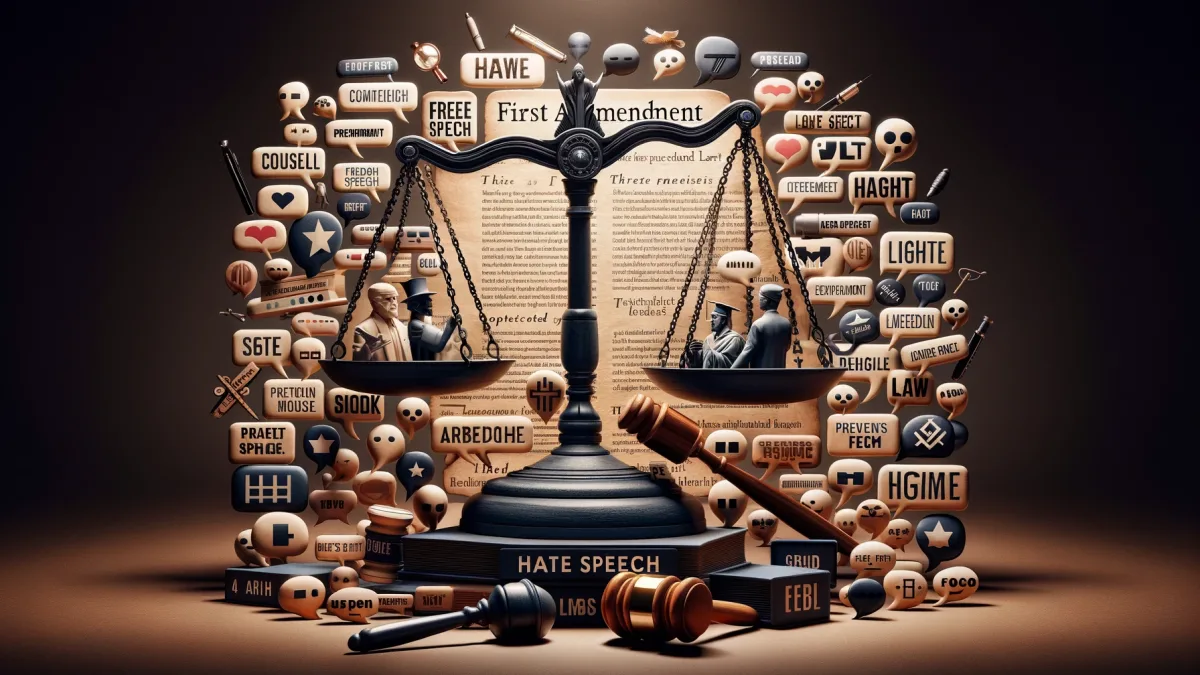Hey there! If you’ve ever found yourself in the middle of a heated debate about the boundaries of free speech, you’re not alone. One of the most contentious and misunderstood areas of American law revolves around hate speech. As a lawyer who digs into the nitty-gritty of legal issues while keeping the jargon to a minimum, let’s unpack this together, shall we?
The First Amendment and Free Speech: A Broad Canopy
First off, the First Amendment of the U.S. Constitution is where we start. It’s the big umbrella that protects freedom of expression, stating that “Congress shall make no law… abridging the freedom of speech.” This protection is incredibly broad, covering a wide array of expressions, including those that are unpopular, controversial, or even repugnant to the majority.
Hate Speech: A Tricky Terrain
So, where does hate speech fit into this picture? Hate speech, defined as speech, gestures, conduct, writing, or displays that may incite violence or prejudicial action against or by a particular individual or group, or because it disparages or intimidates a particular individual or group, wanders into tricky legal terrain. The crux of the matter in the U.S. is that hate speech, as a category, is not specifically outlawed under federal law due to the protections afforded by the First Amendment.
But Wait, There Are Limits
However, this doesn’t mean that all speech is free from legal consequences. The Supreme Court of the United States has acknowledged certain limits. Speech that incites imminent lawless action, true threats, or is part of a crime (such as harassment or stalking) can cross the line into illegality. The distinction often lies in the speech’s context and intent, rather than the content alone.
Case in Point: Landmark Decisions
Several landmark Supreme Court cases have shaped our understanding of what constitutes protected speech versus what can be regulated or punished by law. Cases like Brandenburg v. Ohio (1969), which established the standard for speech that incites imminent lawless action, and Virginia v. Black (2003), which tackled cross burning and true threats, illustrate the complex balance courts strive to maintain between protecting free expression and preventing harm.
The Role of State Laws
It’s also worth noting that while the federal stance on hate speech is grounded in the First Amendment, state laws can introduce their nuances, especially when speech accompanies criminal actions. For instance, hate crime legislation in many states enhances penalties for crimes motivated by bias against the victim’s race, religion, gender, sexual orientation, or other characteristics. This is where speech intertwined with criminal conduct may face legal repercussions.
Navigating Legal and Social Landscapes
The legal landscape around hate speech is as much about societal values as it is about constitutional law. In a society that values both individual rights and community harmony, finding the balance is ongoing. Educational initiatives, community dialogues, and advocacy play vital roles in addressing the root causes and impacts of hate speech while respecting constitutional rights.
So, Is Hate Speech Illegal?
To circle back to our original question: Is hate speech illegal? The answer is nuanced. While hate speech, in its purest form of expression, is protected under the First Amendment, there are contexts and associated behaviors where it crosses the line into illegality. Understanding this distinction is crucial for navigating conversations about freedom of expression and its limits.
Final Thoughts: A Call for Awareness and Action
As we continue to grapple with these issues, the call for awareness, education, and proactive engagement in our communities becomes increasingly important. Whether you’re a legal professional, advocate, or concerned citizen, contributing to a more informed and respectful discourse around the complexities of hate speech and legal boundaries is essential for fostering a society that values both freedom and respect for all its members.
Remember, the law serves as both a reflection of and a framework for societal values. By staying informed and engaged, we can all play a part in shaping a community that navigates the fine line between protecting freedom of expression and ensuring a respectful, inclusive society.









Leave a Reply